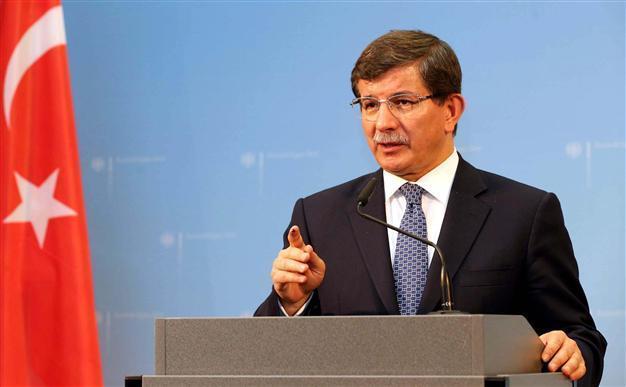Turkey rekindles Syria hopes after Amman meet

FM Ahmet Davutoğlu. AA Photo
Turkish Foreign Minister Ahmet Davutoğlu has said that Turkey and the U.S. “synchronized” their steps on Syria, during Prime Minister Tayyip Erdoğan’s recent talks with President Barack Obama on May 16. Speaking about the Geneva conference set to be held in June, Davutoğlu added in his press conference on May 24 in Istanbul that as a result of recent efforts, 11 countries would have a “consolidated” position “for the first time” about the future of Syria, as stated in the Amman conference on May 23.Davutoğlu said the “synchronization of steps” with the U.S. and the “consolidation of positions” in Amman were the reasons why Turkey was still hopeful about a Geneva outcome. He added that “up until Amman,” Ankara had been rather pessimistic because of the generally “wavering” performance of the West regarding the Syria crisis.
Davutoğlu puts countries in three categories regarding their positions on Syria: Those insistent on supporting the Bashar al-Assad regime, those who have not got a clear position, and those who take a “gradually escalating” stance against the escalating violence of al-Assad against his own people. He mentions only Turkey and the Arab League countries in this last category.
The first Turkish self-criticism
But has Turkey done everything right with regard to Syria?
In this first bit of self-criticism, Davutoğlu did not use the word “mistake,” but he did admit that there were two main “failures of expectations.”
“We failed to predict that al-Assad could grow so brutal,” he says about the first. “We thought he would stop killing his people at some point in order to keep power and reconcile with the opposition.
We never thought he could use Scud missiles and even chemical weapons against his own people.”
The second “failure of expectation” was related to the international reaction. “We never thought global actors would fail to take action in parallel with what they said. To declare the Syrian regime ‘illegitimate’ but doing almost nothing about it was something that we were unable to guess.”
For Davutoğlu, the “Syria game is not over yet,” but the end of the game is clear to be the defeat of al-Assad. “We had no options other than giving our support to the Syrian people, otherwise we would be denying all the moral and political principles that make us what we are” he said.
On the road to Geneva
Davutoğlu gave no further details about the “synchronized steps” with the U.S., apart from saying they involved “Geneva and beyond.”
If Geneva fails, mainly because of the Russian power-game with the Americans, Ankara would expect an increase in support for the Syrian opposition by the West.
“As we talk now,” he said, “The Syria opposition is trying to restructure itself according to the needs of this new situation to get a result from the Geneva talks. The European Union is also going to meet for a new position regarding Syria which might involve an arms embargo.”
There are already indications following Obama’s meeting with Erdoğan that the U.S. administration is preparing contingency plans for a more active stance, as the House Foreign Relations committee voted last week in favor of more support for the Syrian opposition forces. It seems that the fears about al-Qaeda-affiliated al-Nusra fighters in Syria will be further taken under control, with a clearer attitude from the Syrian opposition distancing itself from the fundamentalist group.
A dangerous move
Foreign Minister Davutoğlu thinks the Bashar al-Assad government in Syria is now playing a “dangerous” game, in order to gain an upper hand before Geneva, which is why al-Assad and his allies have given so much importance to reclaiming the town of Qusair near the Lebanese border. Turkey has intelligence that there are currently more than 1,200 Hezbollah fighters supported by Iran, and Ankara is happy that Hezbollah’s involvement in the Syrian war was mentioned by name and condemned in the joint statement of the Amman conference.
Davutoğlu declines to mention any country names, but underlines that al-Assad wanted to create a sectarian based Sunni-Shite and Nusayri fighting zone from the Lebanese border in the south to Hatay on the Turkish border, in order to divert attention from the civil war in his country. Davutoğlu believes the Reyhanlı bombings on May 11 in which 51 people were killed were part of that Syrian strategy.
Ankara believes that whenever Damascus seizes an opportunity it tries to abuse it by playing with time. That is why Davutoğlu wants to see Geneva talks to come up with a deadline for a transitional government in Syria to give an end to the bloody civil war. Will this be with or without al-Assad himself? That is the question, and it seems that more and more people want to see the Russian thumb pointing down.











